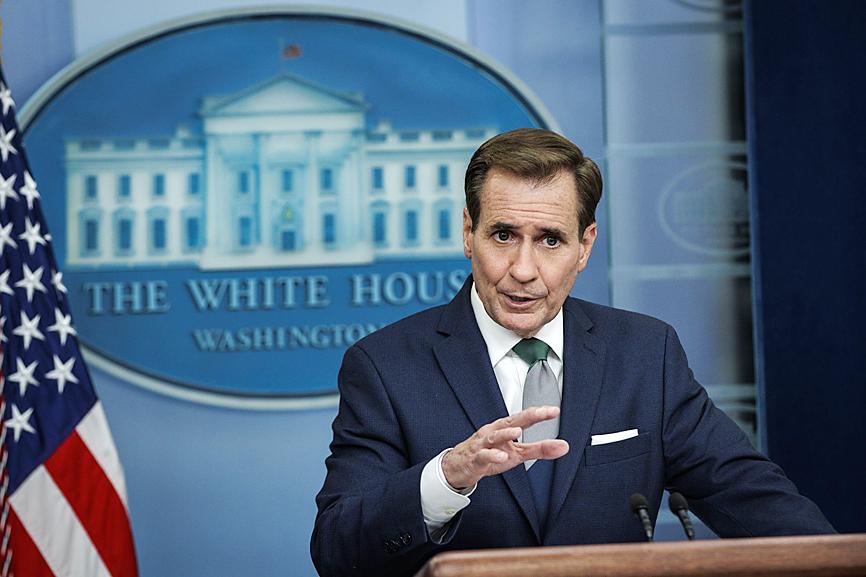There is no reason for China and the US “to come to blows” should US House of Representatives Speaker Nancy Pelosi visit Taiwan during her current trip to Asia, the White House said on Friday, underscoring the international tensions surrounding her travel plans.
The remarks by National Security Council spokesman John Kirby came as Pelosi offered a rationale for a visit to Asia that she had not before stated.
She referred to US President Joe Biden’s focus on Asia and referenced his recent trip to South Korea and Japan, telling reporters: “He has visited there, his vice president has visited, the secretary of commerce and others, and we want the Congress of the United States to be part of that initiative.”

Photo: Bloomberg
Seeming to stop just short of saying she would make a stop in Taiwan, Pelosi said: “I’m very excited that should we go to the countries, that you’ll be hearing about along the way about the conversations” she would have there.
The US has seen no evidence Chinese preparations for military activity against Taiwan, Kirby said.
“[We have] seen no physical, tangible indications of anything untoward with respect to Taiwan,” he said.
However, China yesterday morning held live-fire military drills in the Taiwan Strait, which Beijing announced via state media yesterday.
The maneuvers were limited in scope and took place off the island of Pingtan in China’s Fujian Province, about 120km from the coast of Taiwan, the statement reported by Chinese media said.
Pelosi and her aides have not confirmed her travel plans or named the countries she might visit, citing security concerns.
China has objected strenuously to any Taiwan visit by Pelosi, warning of “resolute and strong measures” if she does.
Biden said earlier this month that the Pentagon thinks a Pelosi trip to Taiwan is “not a good idea right now.”
In Taipei, defense officials who briefed reporters on Friday declined to discuss any potential preparations for a trip.
Biden has designed his foreign policy in part around countering China’s growing economic and military might. Pelosi’s itinerary has also become a domestic political issue, with some Republicans urging her to visit Taiwan to stand up to Beijing.
Kirby said on Friday that Pelosi “does not need nor do we offer approval or disapproval” for travel, adding: “The speaker is entitled to travel aboard a military aircraft.”
The military routinely supplies aircraft for travel by lawmakers, which presidents have authority to deny. In a highly unusual move, then-president Donald Trump blocked Pelosi and other lawmakers from using a military aircraft to visit Afghanistan during a 2019 dispute over a government shutdown, and after she told him to delay his State of the Union address.
Although US officials often make discreet visits to Taiwan, Pelosi is second in line to the presidency, which has made a possible visit more contentious.
Additional reporting by Reuters and AFP

AIR SUPPORT: The Ministry of National Defense thanked the US for the delivery, adding that it was an indicator of the White House’s commitment to the Taiwan Relations Act Deputy Minister of National Defense Po Horng-huei (柏鴻輝) and Representative to the US Alexander Yui on Friday attended a delivery ceremony for the first of Taiwan’s long-awaited 66 F-16C/D Block 70 jets at a Lockheed Martin Corp factory in Greenville, South Carolina. “We are so proud to be the global home of the F-16 and to support Taiwan’s air defense capabilities,” US Representative William Timmons wrote on X, alongside a photograph of Taiwanese and US officials at the event. The F-16C/D Block 70 jets Taiwan ordered have the same capabilities as aircraft that had been upgraded to F-16Vs. The batch of Lockheed Martin

GRIDLOCK: The National Fire Agency’s Special Search and Rescue team is on standby to travel to the countries to help out with the rescue effort A powerful earthquake rocked Myanmar and neighboring Thailand yesterday, killing at least three people in Bangkok and burying dozens when a high-rise building under construction collapsed. Footage shared on social media from Myanmar’s second-largest city showed widespread destruction, raising fears that many were trapped under the rubble or killed. The magnitude 7.7 earthquake, with an epicenter near Mandalay in Myanmar, struck at midday and was followed by a strong magnitude 6.4 aftershock. The extent of death, injury and destruction — especially in Myanmar, which is embroiled in a civil war and where information is tightly controlled at the best of times —

Taiwan was ranked the fourth-safest country in the world with a score of 82.9, trailing only Andorra, the United Arab Emirates and Qatar in Numbeo’s Safety Index by Country report. Taiwan’s score improved by 0.1 points compared with last year’s mid-year report, which had Taiwan fourth with a score of 82.8. However, both scores were lower than in last year’s first review, when Taiwan scored 83.3, and are a long way from when Taiwan was named the second-safest country in the world in 2021, scoring 84.8. Taiwan ranked higher than Singapore in ninth with a score of 77.4 and Japan in 10th with

SECURITY RISK: If there is a conflict between China and Taiwan, ‘there would likely be significant consequences to global economic and security interests,’ it said China remains the top military and cyber threat to the US and continues to make progress on capabilities to seize Taiwan, a report by US intelligence agencies said on Tuesday. The report provides an overview of the “collective insights” of top US intelligence agencies about the security threats to the US posed by foreign nations and criminal organizations. In its Annual Threat Assessment, the agencies divided threats facing the US into two broad categories, “nonstate transnational criminals and terrorists” and “major state actors,” with China, Russia, Iran and North Korea named. Of those countries, “China presents the most comprehensive and robust military threat